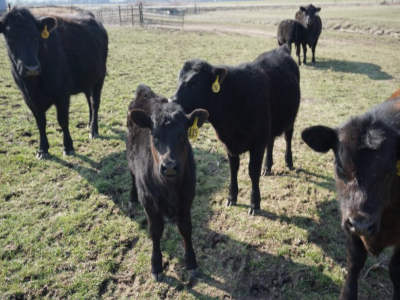By Jonathan Ahl
Using electronic tags to track livestock is widespread in Europe. Proponents say it helps prevent and contain food-borne illnesses, but the idea is finding a mixed and often chilly reception in the United States.
Radio frequency identification, or RFID tags, can be put on an animal’s ear similar to the metal identification clips currently used to identify animals and track them for inventory and health purposes.
But the RFID chips send out a signal, which is captured by a reader that uploads information into a database. They are in common use in industries including logistics and amusement parks.
The U.S. Department of Agriculture supports the idea of using RFID tags to track cattle that cross state lines. While that is just a toe in the water of what the technology could eventually be used for, it has livestock producers, ranchers, state departments of agriculture and farm bureaus weighing in with widely differing opinions.
“When I first saw RFID tags, I asked myself, ‘Who is this going to benefit?’” said Darvin Bentlage on his farm near Golden City in southwest Missouri. “I couldn’t see much benefit to my operation, but I certainly knew who was going to pay for it.”

Darvin Bentlage's cows, with each with a low-tech ear tag.
Bentlage said every time something new comes to the livestock industry, the cost is placed on the producer, and that increased cost isn’t reflected in the price they get for their animals.
“RFID tags means purchasing extra equipment. You’re going to buy those tags, which aren’t cheap, and you're going to have to buy readers,” Bentlage said.
RFID tags cost $2 to $5 a head, according to Oklahoma State University Extension, while the metal tags they replace cost less than a quarter.
Bentlage isn’t alone in his concern. The Missouri Department of Agriculture is planning on working with any USDA rule, but Director Chris Chin said she opposes any federal requirement that passes the cost on to small producers.
“We want to make sure this isn’t an unfunded mandate on the agriculture community that could further force family farms out of business,” Chinn said.
But Chinn also said that the industry has to be aware of how such rules, or the lack of them, could affect farmers' ability to trade.
“We need to think about the impact and effects it will have on trade agreements and being in compliance with global trade regulations that are set by the World Trade Organization,” Chinn said.
The U.S. Cattlemen's Association, one of the trade groups representing the nation’s livestock industries, has taken the official position that it's supportive of RFID tags, albeit with some concerns, including cost.
Dwight Keller, a rancher in North Dakota and the Cattleman’s Health Committee chair, said the metal clips with ID numbers currently in use are adequate and cheaper.
“It serves the same purpose. Let them use either or, you know? It will sort itself out with time. And it will give producers time to get used to it,” Keller said.
Keller chooses to use RFID chips on his animals but said it should be a choice, at least for now. He said the chips save him time and money in managing his herd. But even that is a point of contention in the RFID debate.
Garrett Hawkins, president of the Missouri Farm Bureau, said there needs to be more proof that the technology is effective for quickly scanning animals and uploading information to where it needs to be.
“Can that technology actually keep up with the speed of commerce?” Hawkins asked during a virtual meeting of the Missouri Farm Bureau.
Some states, including Kansas, are doing small-scale testing of RFID technology. So far, many of the conclusions are supportive of the concept with concerns over cost and efficiency.
Kansas is giving out free RFID chips to accredited veterinarians to help track sick animals, but according to the department’s website, “at this time there is some uncertainty how far into the future this program will exist.”
Another test is underway in St. Onge, South Dakota, where U.S. Cattleman Vice President Justin Tupper owns and operates a livestock auction. He said a next and reasonable step to adopting RFID tags for cattle would be to require them in heifers, young females that haven’t yet had a calf after they are vaccinated for brucellosis, a bacterial infection also known as Bang’s disease.
Click here to see more...